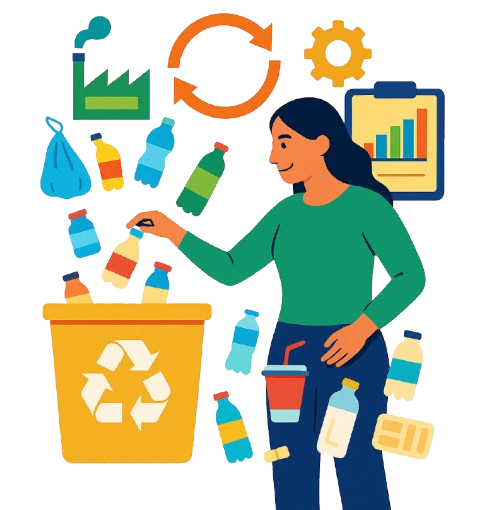EPR for Plastic Packaging Waste in India

Plastic Waste EPR Compliance & Advisory Services
Simplifying Plastic Waste Management Through End-to-End EPR Consulting
What is EPR for Plastic Packaging?
- Category I – Rigid Plastic Packaging
- Category II – Flexible Plastic Packaging
- Category III – Multi-layered Plastic (MLP) Packaging
- Category IV – Compostable Plastics

Types of Plastic
PET
Polyethylene terephthalate
Soft drink bottles, tote bags, furniture, carpet, paneling
HDPE
PVC
LDPE
PP
Polypropylene
Auto parts, industrial fibres, food containers, and dishware
PS
Other
Our End-to-End EPR Compliance Services include:

Business Assessment & CPCB Registration
- EPR Applicability Assessment
- Data Collection Templates
- CPCB EPR Portal Registration
- Category-wise plastic packaging disclosure
- Portal Management

Post-Registration Compliance & Documentation
- Purchase & Sales Reporting
- Plastic Packaging Inventory Management
- EPR Target Calculation
- Annual Return Filing on CPCB Portal
- CPCB Wallet Tracking & Reconciliation

Credit Procurement
- Credit Requirement Strategy & Planning
- Recycler Due Diligence
- Procurement Documentation
- Traceability and Geo-Tagged Records

Risk Assessment, Advisory & Training
- On-ground Verification of Recycler Infrastructure
- Compliance Risk Assessment (Recycler, Aggregator)
- Stakeholder Training Sessions & Compliance Awareness
- Real-Time Dashboards via EPR Sync
Supporting Circular Economy through Advisory
Advisory on Recycled Content & Reusability
Packaging Design for Recyclability
Plastic Neutrality Strategy Development
ESG Integration & Reporting Alignment
Why Choose A2G?

250+ EPR Registrations
Fast & accurate onboarding with CPCB
300+ PIBO Clients
Experience across FMCG, electronics, pharma & retail
₹1 Million+ Saved
Avoided penalties through proactive compliance
Zero Non-Compliance
100% track record in return filings
Tech Integration
Dashboards, alerts, and audit-ready data management
PAN India Reach
Serving clients across metro cities and Tier-2 hubsFrequently Asked Questions
EPR means the responsibility of a producer for the environmentally sound management
of the product until the end of its life.
Yes. MoEF&CC vide Fourth Amendment to Plastic Waste Management Rules 2016 notified EPR Guideline on February 16, 2022
The following entities shall register on the centralized portal developed by CPCB:
I. Producer (P)
II. Importer (I)
III. Brand owner (BO)
IV. Plastic Waste Processor engaged in
(a) recycling, (b) waste to energy, (c) waste to
oil, and (d) industrial composting.
PIBOs which are operational in one or two states/UTs are required to register with the
concerned with SPCB/PCC
PIBOs which are operational in more than two states/UTs are required to register with
CPCB.
1. PDF copy of Company’s PAN, CIN & GST (the combined copies of GST invoices in all the States/UTs where the PIBO is operating).
2. PDF copy of Authorized person’s PAN & Aadhar.
The following plastic packaging categories are covered under EPR:
Category I : Rigid plastic packaging
Category II : Flexible plastic packaging of single layer or multilayer (more than one
layer with different types of plastic), plastic sheets or like and covers made of plastic
sheet, carry bags, plastic sachet or pouches
Category III : Multilayered plastic packaging (at least one layer of plastic and at least
one layer of material other than plastic)
Category IV : Plastic sheet or like used for packaging as well as carry bags made of
compostable plastics
For details please refer EPR Guidelines ( Section 5)
Pre-consumer plastic packaging waste” means plastic packaging waste generated in
the form of reject or discard at the stage of manufacturing of plastic packaging and
plastic packaging waste generated during the packaging of product including reject,
discard, before the plastic packaging reaches the end-use consumer of the product.
“Post-consumer plastic packaging waste” means plastic packaging waste generated
by the end-use consumer after the intended use of packaging is completed and is no
longer being used for its intended purpose.
EPR target is the plastic waste which is introduced in the market by the PIBO . Details
given in section 7 of the EPR Guidelines may be referred to.
All producers are required to submit the consents issued to their production facilities.
Brand-owners having their own production facilities are required to submit the consents
